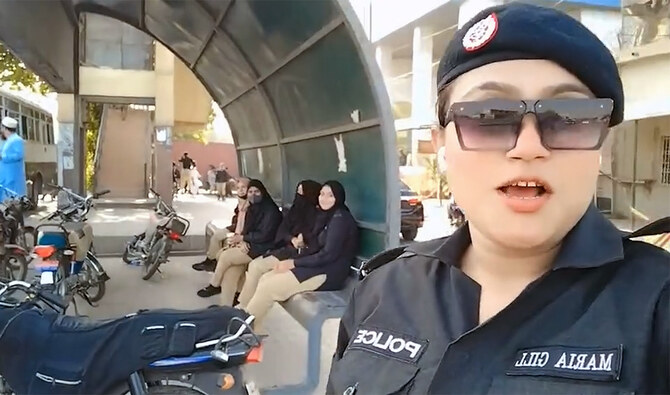KARACHI: A woman police constable in Karachi has been suspended after posting an “irresponsible” TikTok video in which she can be seen inviting viewers to meet her at a location where she and some other colleagues had been posted on duty, a senior police official said on Tuesday.
Maria Gill, a constable at the Gizri police station in the Pakistani port city, shared a video on TikTok showing her and a group of colleagues stationed at a bus stand.
“Hello guys ... So, today I’m deputed at Mai Kolachi Road, near Bahria College,” she says in the video, moving the camera to show fellow policewomen in the background.
“As you can see, the entire team is present here, and that’s my bike parked over there. If anyone wants to meet me, they can come here.”
The video prompted “immediate action” from police authorities, who suspended Gill for her actions, Syed Asad Raza, Deputy Inspector General of Police for South Karachi, said, adding that government servants were required to maintain “discretion and moderation” in their use of social media and uphold “high standards of propriety.”
“As seen in the video, she is also unnecessarily endangering the privacy and lives of her fellow colleagues,” Raza told Arab News. “The police are a professional institution and such irresponsible acts cannot be tolerated.”
Raza said Gill had been served a notice to explain her actions and would stay suspended as long as disciplinary proceedings were ongoing.
This is not the first time a police officer in Pakistan has faced disciplinary action for social media activity deemed inappropriate by higher-ups.
In August 2024, lady Constable Maryam Bhatti was dismissed from the Rawalpindi police for similar reasons.
On July 31, 2024, Constable Muqaddas from Islamabad was dismissed from the Federal Police’s Counter-Terrorism Department for making a TikTok video while using an official vehicle.
On July 29, 2024, Assistant Sub-Inspector Inayatullah Niazi was suspended in Chiniot for allowing a transgender person to film a video in the SHO’s office, which was deemed “disrespectful” to the police uniform.
On February 27, 2024, Constable Bahawal Sher was suspended in Faisalabad for sharing a video on social media where he was seen smoking while uniform and displaying pistols.
Lady Constable Sumbul from Sindh faced an investigation on October 14, 2023, for posting a controversial video supporting Israel while Lady Constable Mehwish Khan was suspended on May 16, 2022, in Muzaffargarh for uploading videos in police uniform.
On July 24, 2020, Constable Wafa Tauqeer was suspended in Lahore after a TikTok video of her in uniform went viral.

















